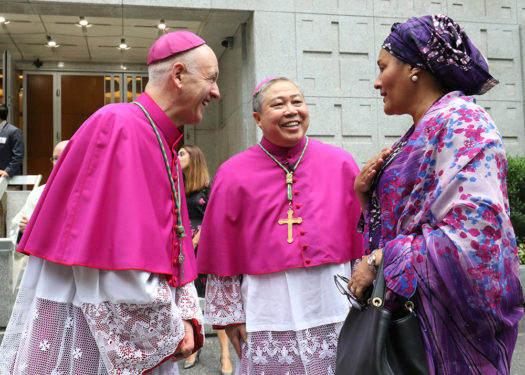
By Christopher White, The Tablet’s National Correspondent
One year after Pope Francis’ visit to Colombia, where he urged forgiveness and reconciliation in a nation seeking to end its 50-year civil war, U.N. delegates attending an annual prayer vigil for the opening of the General Assembly were reminded that peace, while challenging, is achievable.
“Real peace cannot be imposed by force,” Archbishop Luis Castro Quiroga told attendees Monday evening. “Peace begins to come alive and to take shape at the negotiating table with a sincere and truthful dialogue.”
Castro Quiroga leads the archdiocese of Tunja, Colombia, and as former head of the nation’s bishops’ conference, he spoke with firsthand experience from his work on the Colombia peace deal, which was signed in 2016 between the government and the armed guerilla forces with critical support of the local Church.
He delivered a meditation for the prayer service, which took place at the Church of the Holy Family, known as the U.N. parish, where he told the nearly 70 diplomats and over 50 religious leaders that the international community’s work in both peacemaking and peacebuilding has spiritual foundations.
“Above all, peace is a blessing from God, a gift and not an imposition,” he said. “God offers this blessing of peace and He wants us to receive it.”
“Peace is not passive but dynamic,” Castro Quiroga maintained. “Peace expresses itself in defense of the life of the more vulnerable. It may be the poor, the sinner, the sick, the victims of violence, or children. This defense is a revolt against selfishness, greed, injustice or against anything that may harm human beings.”
He noted that during Pope Francis’ visit to Colombia, he used the word “peace” some 42 times.
The pope’s spirit loomed large over the prayer service as attendees recited his Prayer for the Earth from his 2015 encyclical on care for creation, “Laudato Si'”, along with his Prayer for Refugees and Migrants from his April 2016 visit to Lesbos, Greece.
Also in attendance was U.N. Secretary-General António Guterres who said the annual prayer service was both a bridge between each session of the General Assembly, but also a bridge between people of diverse backgrounds – “people of different faiths, nationalities, and traditions united in a common cause.”
While Guterres acknowledged that global conflict often seems “intractable,” he said the presence of Castro Quiroga was “a powerful message…that peace is possible, that war is not inevitable.”
He urged the delegates to turn their prayers into deeds in the year ahead.
Guterres, who is a Portuguese Catholic, was elected in January 2017 and has attended the Holy See’s Mission to the U.N.’s prayer service for the past two years.
